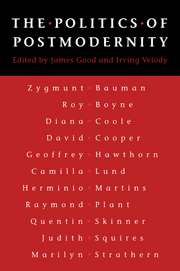Book contents
- Frontmatter
- Contents
- Acknowledgements
- Notes on contributors
- 1 Introduction: postmodernity and the political
- Part I Modernity and its vicissitudes
- 2 Parvenu and pariah: heroes and victims of modernity
- 3 Private and public in ‘late-modern’ democracy
- 4 Modernity and disenchantment: some reflections on Charles Taylor's diagnosis
- 5 Postmodernism and ‘the end of philosophy’
- Part II The critique of modernist political thought
- Part III Technology and the politics of culture
- Index
4 - Modernity and disenchantment: some reflections on Charles Taylor's diagnosis
Published online by Cambridge University Press: 05 June 2012
- Frontmatter
- Contents
- Acknowledgements
- Notes on contributors
- 1 Introduction: postmodernity and the political
- Part I Modernity and its vicissitudes
- 2 Parvenu and pariah: heroes and victims of modernity
- 3 Private and public in ‘late-modern’ democracy
- 4 Modernity and disenchantment: some reflections on Charles Taylor's diagnosis
- 5 Postmodernism and ‘the end of philosophy’
- Part II The critique of modernist political thought
- Part III Technology and the politics of culture
- Index
Summary
The historian Alexander Kinglake wanted the following inscription to be placed on all churches: Important if true. The same motto could equally well be inscribed on Charles Taylor's masterly book, Sources of the Self (1990), the work I shall treat as both my point of departure and my stalking horse in this effort to contribute to the reflections on postmodernity that go to make up this volume. In part the appropriateness of beginning with Kinglake's remark is simply a tribute to the intellectual weight of Taylor's achievement. But in part it stems from the fact that the final message of Taylor's book, like that of the churches, is that our present secularised outlook may be inadequate to meet the moral challenges posed by modernity. It is this aspect of Taylor's diagnosis of the ills attending our modern condition that I chiefly want to examine in what follows.
Taylor's wish to question and transcend our ‘stripped-down secular outlook’ appears in Sources of the Self in connection with his analysis of what he takes to be ‘the moral imperatives which are felt with particular force in modern culture’ (pp. 495, 520). Although Taylor states and restates his list of these imperatives at a number of different points, he cannot I think be said to do so at any stage with complete consistency. Without being over-schematic, however, I think one can say that he distinguishes four main elements in our modern vision of ‘strongly valued’ goods (pp. 4, 14, 20, 42).
- Type
- Chapter
- Information
- The Politics of Postmodernity , pp. 49 - 60Publisher: Cambridge University PressPrint publication year: 1998

